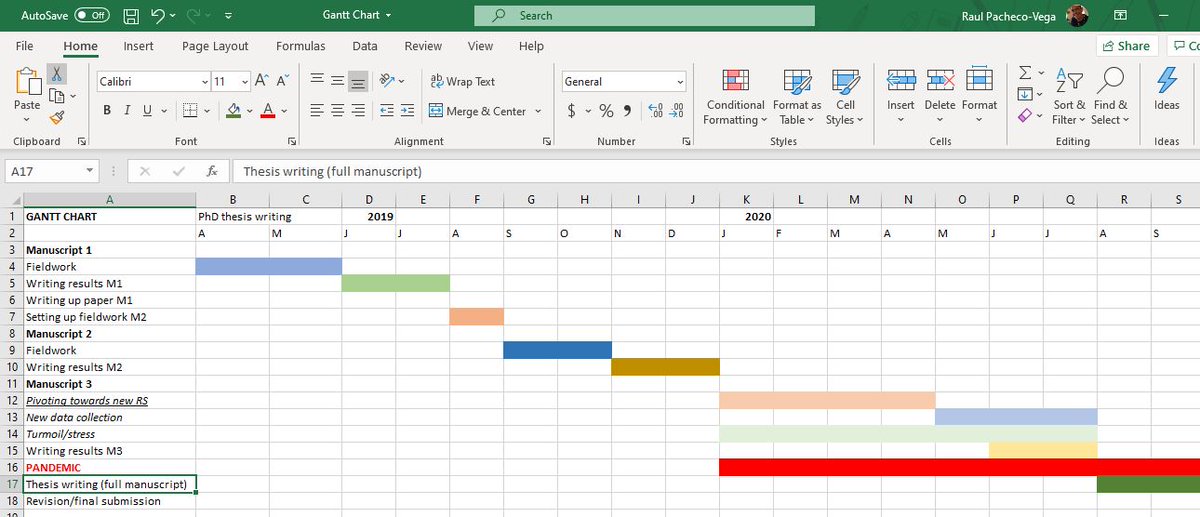"how can I get started with my thesis?"
I promised that this evening I would do a thread and a blog post so they could refer to them.
Here it goes.
I'll start from the baseline that you (student/doctoral candidate) have already done everything except the thesis.
1) Obviously, Dr. Inger Mewburn, The Thesis Whisperer @thesiswhisperer - thesiswhisperer.com/useful-resourc… she offers a wealth of resources on how to write the thesis for students AND for supervisors.
3) Dr. @evalantsoght who published The A to Z of the PhD trajectory springer.com/gp/book/978331… fantastic book
5) Dr. Patrick @PJDunleavy Dunleavy who wrote "Authoring a PhD" raulpacheco.org/2018/05/author… a book I refer to on a regular basis when talking with my own PhD students.
I already have my own PhD, I don't need any of these books.
I bought over a dozen volumes with my own money so that I could improve and become a better thesis advisor, that's why I did it.
Having provided all these resources, I should warn you that I'm writing from my Mom's house in Leon, and therefore I am in no way, shape or form close by any of my books on "how to do a PhD thesis".
So...
I'm also assuming you've discussed with your PhD committee and/or your thesis advisor(s) the scope of your work raulpacheco.org/2017/07/narrow…
There's an intermediate step between PhD comprehensives and thesis.
My PhD students started writing as soon as they returned from fieldwork (because they did a 3 paper dissertation).
The only one of my PhD students who did a book manuscript ALSO started...
Because my students with 3 papers did fieldwork in 3 different places, what I recommended was to start writing the results sections of all three papers (and the methods and data sections). THEN I asked them to write each paper separately
* you and your advisory committee already applied backcasting techniques and planned your thesis or dissertation writing timeline raulpacheco.org/2018/10/planni…
THIS is fundamental. The number of months you have to write the full draft of the thesis...
There will be things that will distract you, de-stabilize you emotionally and require you to process them. Make space (mental) and time for processing these emotions.
I'm always a worrier.
Doing this pivoting requires time to think, etc.
I have changed my priors around many things.
Fieldwork, new reading, delving into other literatures changes the way I think. My writing evolves, my thinking does too.
An example:
I say this because, if you are thinking that you've collected all the literature, data, etc. and now you're just going to sit down and write the thesis and it's going to feel like a linear process, you're deluding yourself.
THAT'S NOT HOW ANY OF THIS WORKS.
And then you're going to find out that the final abstract, introduction and conclusion of your dissertation aren't going to be exactly the ones you first...
Now, on to the other key question that another PhD student asked me:
HOW DO I START WRITING MY THESIS?
I think I get this question more the more often students ask it.
Here's how I think of the process, and how I wrote mine and how I tell my...
1) Write a suggested table of contents.
I don't think I've written a blog post on how to develop suggested tables of contents for theses or books, but those two are on my mind. Until I write those posts, here's what I recommend you do:
The one I'd suggest, off the top of my head, and based on my Dissertation Analytical Table (DAT) and on my Dissertation Two Pager (DTP) devices
1. Introduction
2. Literature Review
3. Paper 1
4. Paper 2
5. Paper 3.
6. Concluding chapter
- Introductory chapters raulpacheco.org/2020/05/how-to…
- Dissertation Analytical Table (DAT) raulpacheco.org/2019/09/the-di…
- Dissertation Two Pager (DTP) raulpacheco.org/2018/08/the-di…
Now, you're probably asking, "how to I budget time for each chapter on a daily, monthly, weekly...
Fear not. What I tell my own students is to
(a) break down their chapters and papers into smaller pieces raulpacheco.org/2016/05/my-dai…
(b) write memorandums that develop each one of these small pieces raulpacheco.org/2020/04/writin…
(c) make it a daily goal to work on ONE item
Studying for a degree is overwhelming enough, so you don't need to add more stress to your life (we're in the midst of a global pandemic, living at home, there is social unrest and worry, there's more than enough worry in our lives)
I always recommend that
I find that for me, structure and routine help.
BEING THIS ORGANIZED AND STRUCTURE MAY NOT WORK FOR EVERYONE.
It works for me, you do you, as you were.
1) Write a draft of your thesis outline/table of contents.
2) Apply backcasting techniques from the date you need to submit the thesis and plan backwards.
4) From your Gantt Chart, break down the tasks that you need to do and realistically can do, and schedule those throughout weeks/days.
Good luck!
</end thread>
- Break down each chapter in smaller pieces
- Write memos that fulfill the goals established in each chapter (e.g. "section on water governance in Latin America", "methods section for paper 3")
- Assemble memorandums...
I'm going to see if I can do the "thesis" version of the diagram that shows how I backcast an R&R raulpacheco.org/2019/03/backca…
Ok, NOW I AM done with the thread.
</end thread>
1) I had already written a blog post on thesis structure, which you can find here raulpacheco.org/2020/02/writin…
2) I forgot to link to Dr. @ThomsonPat blog posts on the thesis writing process: patthomson.net/category/thesi…
I'm writing the blog post right now.
This post is a MUCH MORE EXPANDED VERSION of this Twitter thread, so I recommend you refer to the blog post rather than the thread.




